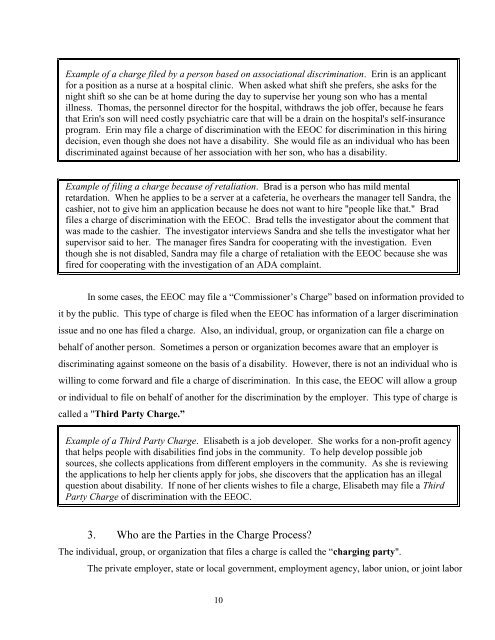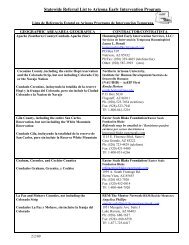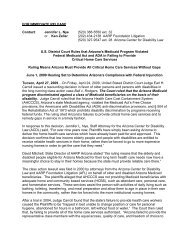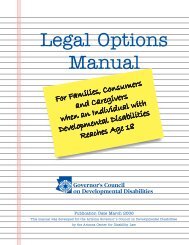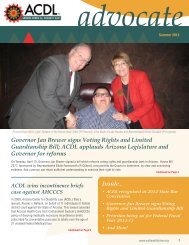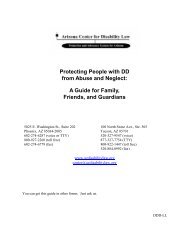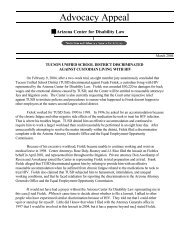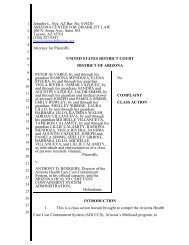How to Enforce Employment Rights Under the Americans with ...
How to Enforce Employment Rights Under the Americans with ...
How to Enforce Employment Rights Under the Americans with ...
Create successful ePaper yourself
Turn your PDF publications into a flip-book with our unique Google optimized e-Paper software.
Example of a charge filed by a person based on associational discrimination. Erin is an applicantfor a position as a nurse at a hospital clinic. When asked what shift she prefers, she asks for <strong>the</strong>night shift so she can be at home during <strong>the</strong> day <strong>to</strong> supervise her young son who has a mentalillness. Thomas, <strong>the</strong> personnel direc<strong>to</strong>r for <strong>the</strong> hospital, <strong>with</strong>draws <strong>the</strong> job offer, because he fearsthat Erin's son will need costly psychiatric care that will be a drain on <strong>the</strong> hospital's self-insuranceprogram. Erin may file a charge of discrimination <strong>with</strong> <strong>the</strong> EEOC for discrimination in this hiringdecision, even though she does not have a disability. She would file as an individual who has beendiscriminated against because of her association <strong>with</strong> her son, who has a disability.Example of filing a charge because of retaliation. Brad is a person who has mild mentalretardation. When he applies <strong>to</strong> be a server at a cafeteria, he overhears <strong>the</strong> manager tell Sandra, <strong>the</strong>cashier, not <strong>to</strong> give him an application because he does not want <strong>to</strong> hire "people like that." Bradfiles a charge of discrimination <strong>with</strong> <strong>the</strong> EEOC. Brad tells <strong>the</strong> investiga<strong>to</strong>r about <strong>the</strong> comment thatwas made <strong>to</strong> <strong>the</strong> cashier. The investiga<strong>to</strong>r interviews Sandra and she tells <strong>the</strong> investiga<strong>to</strong>r what hersupervisor said <strong>to</strong> her. The manager fires Sandra for cooperating <strong>with</strong> <strong>the</strong> investigation. Eventhough she is not disabled, Sandra may file a charge of retaliation <strong>with</strong> <strong>the</strong> EEOC because she wasfired for cooperating <strong>with</strong> <strong>the</strong> investigation of an ADA complaint.In some cases, <strong>the</strong> EEOC may file a “Commissioner’s Charge” based on information provided <strong>to</strong>it by <strong>the</strong> public. This type of charge is filed when <strong>the</strong> EEOC has information of a larger discriminationissue and no one has filed a charge. Also, an individual, group, or organization can file a charge onbehalf of ano<strong>the</strong>r person. Sometimes a person or organization becomes aware that an employer isdiscriminating against someone on <strong>the</strong> basis of a disability. <strong>How</strong>ever, <strong>the</strong>re is not an individual who iswilling <strong>to</strong> come forward and file a charge of discrimination. In this case, <strong>the</strong> EEOC will allow a groupor individual <strong>to</strong> file on behalf of ano<strong>the</strong>r for <strong>the</strong> discrimination by <strong>the</strong> employer. This type of charge iscalled a "Third Party Charge.”Example of a Third Party Charge. Elisabeth is a job developer. She works for a non-profit agencythat helps people <strong>with</strong> disabilities find jobs in <strong>the</strong> community. To help develop possible jobsources, she collects applications from different employers in <strong>the</strong> community. As she is reviewing<strong>the</strong> applications <strong>to</strong> help her clients apply for jobs, she discovers that <strong>the</strong> application has an illegalquestion about disability. If none of her clients wishes <strong>to</strong> file a charge, Elisabeth may file a ThirdParty Charge of discrimination <strong>with</strong> <strong>the</strong> EEOC.3. Who are <strong>the</strong> Parties in <strong>the</strong> Charge Process?The individual, group, or organization that files a charge is called <strong>the</strong> “charging party".The private employer, state or local government, employment agency, labor union, or joint labor10


